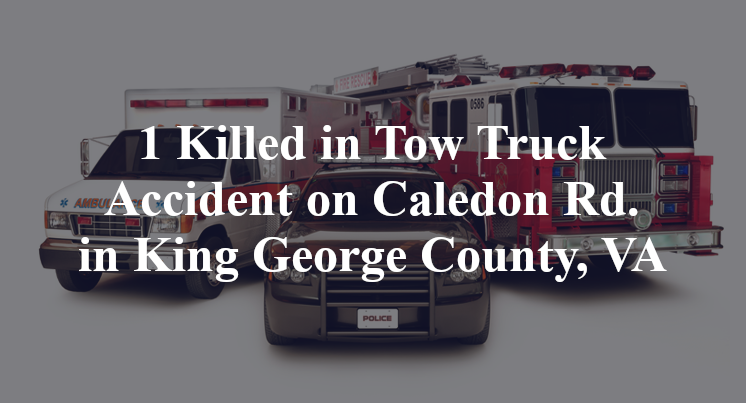1 Killed in Tow Truck Accident on Caledon Rd. in King George County, VA
King George County, VA — March 1, 2025, one person was killed due to a tow truck accident at approximately 9:15 a.m. along Caledon Road.
According to authorities, the accident took place on Caledon Road (State Highway 218). The exact location along Caledon Road where the accident occurred have not been reported.

Details surrounding the accident remain scarce. Officials indicate that, for as yet unknown reasons, a collision took place between a tow truck and another motor vehicle. One person reportedly sustained fatal injuries as a result of the wreck. Additional information pertaining to this incident—including the identity of the victim—is not available at this point in time. The investigation is currently ongoing.
Commentary
When a fatal crash involves a tow truck, the most pressing question isn’t just who collided with whom—it’s what was the tow truck doing at the time of the crash? Tow trucks operate under unusual circumstances: they’re often stopped on shoulders, re-entering traffic, or maneuvering around disabled vehicles. That means their presence on the road introduces unique risks that don’t apply to ordinary vehicles.
At this point, there’s no information about whether the tow truck was parked, moving, turning, or actively towing a vehicle. Each of those scenarios presents different legal questions. If the truck was merging back into traffic or stopped partially in the roadway, visibility and timing come into play. If it was maneuvering to load or unload a vehicle, then the issue may be whether adequate safety precautions—like cones, lights, or flaggers—were in place.
Another key concern is whether the truck was privately owned or operated as part of a commercial fleet. If it's the latter, then the company’s training protocols and safety procedures become part of the investigation. I’ve worked on cases where drivers were expected to multitask—handle dispatch calls, coordinate with stranded motorists, and operate equipment—all while managing live traffic around them. That kind of pressure, without proper safeguards, can lead to deadly mistakes.
None of this is speculation for its own sake. The only way to get to the truth is through evidence: GPS data, dash cam footage, vehicle inspections, and scene analysis. That’s how investigators determine whether the truck’s position or movement played a role in the crash—and whether it could have been prevented.
Key Takeaways:
- It's unclear whether the tow truck was moving, stopped, or actively towing when the crash occurred—each scenario carries different risks.
- Tow trucks operate under special conditions that can affect visibility, timing, and maneuverability in live traffic.
- Investigators must examine whether proper safety precautions were in place, especially if the truck was stationary or partially blocking traffic.
- Company training and operational policies may come into question if the truck was part of a commercial fleet.
- Determining fault requires a full investigation, supported by vehicle data, driver records, and physical evidence from the scene.

“These are essential reads for anyone dealing with the aftermath of a truck wreck”– Attorney Cory Carlson